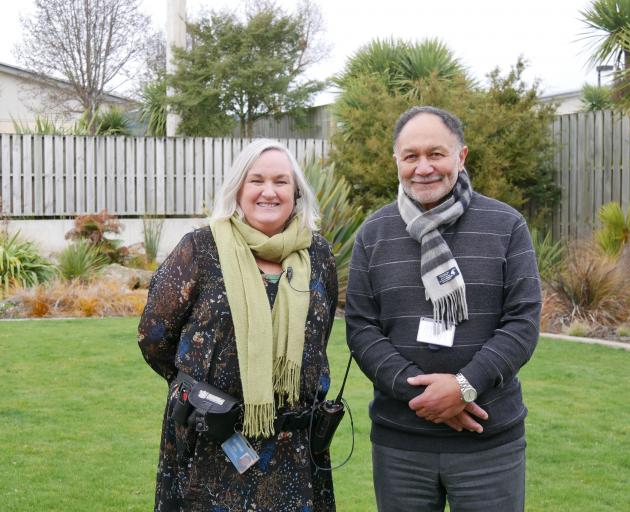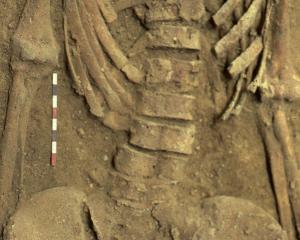
Inmate numbers and prison costs are skyrocketing. Bruce Munro looks at the urgent need for prison reform and talks to ex-prisoner and now polytechnic lecturer Rue-Jade Morgan about growing up in a gang family, his efforts to help inmates and why going to prison was the best thing that could have happened to him.
''Can you see that? Put your hand there, mate.
''I'm not trying to gross you out.''
Running down the middle of this smiling, Polynesian face, from top-knotted hairline to the bridge of his broad nose, is a thin, yet distinct, raised scar.
''That's from me and my little cousins having to head-butt the wall because our parents didn't want to get in trouble for beating us up.''
It is an outrageous, horrifying tale that jangles with awful incongruity in the laidback comfort of the Otago Polytechnic student hub, in Forth St, Dunedin.
Rue-Jade Morgan is a lecturer here, teaching a foundation studies course to students preparing for tertiary education.
It seems almost inconceivable that this friendly, articulate, well-dressed man could be telling his own story - a half-told story that is about to get worse.
''Someone thought I was giving it half-arse. So, I was taken to face the edge of the door frame and told 'Do it, or I'll smash your f***n face'.
The wall was made of concrete cinder blocks.
''So, me, with a touch of oppositional defiance, thought, 'You want me to f***n do this? I'll show you.'
''All I remember was a 'pop' and waking up on the floor, bleeding profusely from my split forehead as well as from my mouth, my nose and my ears.''
That was just one of many life-threatening experiences for Morgan, growing up in what was effectively a gang-family warzone in 1970s Dunedin and Christchurch.
''Nature versus nurture,'' Morgan muses.
''If you look at it from a nurture point of view, I should be some bloody, axe-wielding psychopath. And I should be blaming it on my childhood,'' he adds with a big chuckle.
''So, coming from that to trying to be a well-adjusted human, it took a lot of self-discovery.''

Three days ago, Morgan was in Wellington, at Parliament, shaking hands with Labour's deputy leader Kelvin Davis as he received an award for his work with inmates at Otago Correctional Facility.
Between the boy with the split scalp and the man with the award there were several years spent in prison.
Two decades ago, in his early 20s, Morgan was one of 5600 people incarcerated in New Zealand prisons.
Now he is back, attempting to rehabilitate inmates through Maori culture, martial arts and education.
But in the meantime, the problem has grown much worse.
The country's 15 prisons are now 18 prisons, and they are bursting at the seams. The number of inmates has almost doubled to more than 10,300.
We are locking people up so quickly, the courts cannot keep up. More than a third of those inside are on remand - imprisoned awaiting their day in court or sentencing.
Projections are for the prison population to keep climbing. The previous government had committed to 1800 more prison beds, including a 1500-bed ''super prison'' at Waikeria, in the Waikato.
The number of female prisoners has increased at at even greater rate than the men. But males still account for more than 90% of the prison population.
Incarceration doesn't seem to be doing the trick. More than half of those released (52%) are back inside within five years.
The picture is worst for Maori. Although they make up only 15% of the population, they are 53% of the prison muster.
Re-imprisonment for Maori is 58% and re-conviction is 77%.
The money being poured into keeping New Zealanders under lock and key is eye-watering. In the past financial year, $1.67 billion was spent by the Department of Corrections. That is as much as was spent on the Ministry of Primary Industries, the Department of Conservation and the Ministry of Foreign Affairs and Trade, combined.
While in Opposition, Kelvin Davis was a vocal critic of New Zealand's prison system.
He described the Corrections system as ''the closest we get to building a bonfire and unquestioningly throwing tax-payer cash into it, to keep it burning indefinitely''.
In a rare exception to the rule, Davis actually asked to be Minister of Corrections, rather than have the poisoned chalice foisted on him, and has described the cycle of prison, reoffending and more time locked up as ''such a waste of human potential''.
He and Minister of Justice Andrew Little have vowed to reduce the prison population by 30% in 15 years.
Some call it wishful thinking. Others, a plan to push criminals back on to the streets.
Video: Mou rokau class at Otago Corrections Facility
GIVEN the intractable, multi-generational nature of the problem, what approaches to prison reform could possibly turn the tide?
Mr Davis says there is no silver bullet. But changing the way the Department of Corrections sees its role and finding better ways of operating on as many fronts as possible will reverse the tide, he believes.
''We have some of the highest incarceration rates per capita in the world. We've had decades of rushed policy and reactive decisions that got us to the point where, when we came into government, we had 10,400 people in prison.
''We need to understand that a rising prison population is not inevitable. There are things that can be done to stop that flow and still make sure that communities are safe.''
Improvements will not be made suddenly or in large numbers, he warns.
''It's going to be 20 here, 30 there, 150 over there.''
For example, to tackle the large number of people on remand, dedicated courts personnel are helping people fill out their bail applications.
''If they are illiterate ... their chance of getting bail is negligible. Whereas, we now have staff who help people get bail-ready, so the judge has more options.''
That simple innovation already appears to be having an effect. Last week, the nationwide prison muster had dipped slightly to 10,325.
He concedes that a number of positive programmes, such as beginning to address the enormous mental health needs of prisoners and working harder to get ex-prisoners employment, were started by the previous Government.
''If it works, it works,'' is his pragmatic response.
But he also promises new ideas will come from the Criminal Justice Summit being held in a fortnight.
Many of those better ways of operating will be driven by Corrections staff themselves, Mr Davis says.
''I don't think the environment, prior to us getting into government, was conducive to Corrections just putting on their thinking caps and coming up with solutions.
''I've said to them, our goal is to reduce reoffending by 30% in 15 years. Now put on your thinking caps and come up with ideas and let's explore them.
''I tell them [Corrections staff] you're not just jailers, you're not just there to lock people up. You're there to protect New Zealanders. And by helping the people in prison, you're helping to make New Zealand a better country.
''Corrections, I think, has really embraced that challenge and is up for it.
''The fact that we are trying different things is very exciting.''
For many inmates, rehabilitation is an in-depth and lengthy process, Mr Davis says.
''We sort of assume that people grow up with a set of values and then they somehow forget them and that causes them to commit crime.
''Well, some people actually haven't grown up with these values that many of us have. Prison becomes the first time they are exposed to them.''

Davis admits reducing the prison population is personal.
A couple of extended family members have been in prison. And being Maori, and a Maori MP, adds to the incentive, he says.
''These are my people I'm talking about.
''I grew up in a street where a number of people living there went to prison. These were all my mates; guys I used to build huts with and play in the paddocks with. And I just think, this isn't right.
''I want to help them out, help them get their lives back on track, become contributing members of communities and never go back. It's just such a waste of human potential.''
In the mid-1990s, Morgan was sentenced to six years for aggravated robbery.
He had been trying to find a positive path for his life. But he ended up robbing drug dealers of money and drugs.
''I thought I had to play the hand I thought I'd been dealt. Otherwise you fold. And if you fold, you're out.''
His mother was in court when he was sent to the high-security wing of Paparua Men's Prison, on the outskirts of Christchurch.
Recalling that day brings tears.
''She said to me, 'No boob tattoos [unskilled prison tattoos] and come out a better man'.''
When a Corrections officer, a prison guard, asked him what he wanted to do with the next few years he replied, ''Anything Maori''.
''I had spent 19 years trying to be Pakeha, and look where it got me.
''I thought, maybe being Maori can get me out of here and keep me out.''
Maori-focused programmes were rare despite the high numbers of incarcerated Maori. Morgan, however, was fortunate enough to meet some men who, despite their gang backgrounds, had knowledge of te ao Maori, the Maori world.
He began to learn tikanga Maori, Maori culture, and te reo, the Maori language.
By the time he was transferred to low-security Rolleston prison, they had formed their own haka group and, under the tutelage of Te Mairiki Williams, Morgan was becoming a skilled exponent of mau rakau, traditional staff and taiaha fighting.
His life was now on a different trajectory, aided by whakatauki, proverbs, instilled in him by his taua, his grandmother, when he was a young boy.

A saying Morgan built his new life on was ''Aroha ki te tangata'', compassion for all people.
There were many opportunities inside to put that into practice. Such as the time when, at Rolleston, where inmates were able to tend their own gardens, three white power inmates came asking for food.
''Inside, we had gangs and we had neutrals. The neutrals were us, who said, 'Nah, let's get people well, let's get people out and never coming back'.
''Three skinheads come over and said, 'Oh Jade, we're really starving. Do you mind if we have a feed?'
''I guess I've always been inclusive. So, as long as they don't want to hurt me, great, how can I help?
''I said, 'Of course you can lads, just gotta sing some songs. We're doing some cultural activities first. So, if you're willing to join us - just read the words and do as best you can - then you're more than welcome to join us'.
''So, these three beautiful skinheads were sitting there with us singing 'te aroha...'''
Morgan beams at the memory.
Getting people well, getting When he told his taua that the school teacher wanted to know which iwi he was from, she was deeply concerned and his grandfather gave him some advice.
''Don't worry about being Maori,'' his grandfather said.
''Be a doctor, be a lawyer, be anything, but don't be Maori.''
Morgan later discovered that a generation before, his mother and her siblings had repeatedly been sent home from the same school with notes saying they had been physically punished for speaking Maori in the playground and that they should be punished at home for the same offence.
Returning to Christchurch did not really remove the gang links.
''Here in New Zealand, gangs are not substitute or ad hoc family but, in most cases, they are literally family.''
He describes growing up in a gang family as living in a glasshouse, with your nose pressed up against the glass, while a fire, representing the terror and allure of gang existence, burns in the centre of the glasshouse.
''All kids in gang families are sitting with their noses pressed up against the glass, wanting more in life.
''But despite windows and doors being open, they haven't been told they can leave, so they don't.
''Then they hear the crackle of the fire.
''There are those born of the flame who want nothing more than to get out. And there are those who are drawn to the flame, and get burnt by it.''
Schooling ended for Morgan at the age of 14.
His mother had gone ''walkabout''. He had paid for his school books and fees but had no money left for a school uniform or for food.
''I tell all my cousins, unless you can tell me about surviving on carrot soup for two weeks, then don't tell me nothing about being hungry.
''For two weeks ... all I had was two carrots. And I made those carrots last.''
On top of that, he was told at school that if he didn't have money for a uniform he would never amount to anything.
''Fortunately, I've got a bit of oppositional defiance and a can-do attitude. So, I was willing to do whatever it took to get me out of the mud.''
Morgan left school and talked his way into work at a rubber vulcanising factory.
He later found another job and did some job training. Each was one more deliberate step away from gang life.
But then, aged 19, he met a guy who, while he seemed to be on the up-and-up, actually had a sideline as an armed burglar.
''And because I'd had a few drinks ... I said, 'Sure, let's go for a ride'.''
A few months and several armed robberies later, they were nabbed by the police.
''Thank heavens I got caught,'' Morgan says.
''Had I not been, the plan was to get involved again with my family, to put on the patch.
''I'd either be a horrible person, who I don't want to be, in jail serving life or pushing up daisies.
''I credit getting caught as the biggest help to me at that time in my life.''
Asked whether his story of escape and miraculous transformation is an exception, Morgan first says ''I hope not''.
He then relates the story of a ''notorious and respected'' senior gang member who has been through his programme during the past year.
''For 28 years of his life he rejected his Maoritanga.
''When he came down here he thought, 'Well, what's the worst that could happen?' and decided to give it a go.
''He freely states that that's when things started to happen for him. He is now talking with his father who had disowned him for his gang life.
"He told the other participants, it's an awakening, it's a coming home.''

Outside, looking in: prison and inmate statistics
The prison population has skyrocketed.
• November, 1999: 5647 inmates, 233 female, 5414 male, 4965 sentenced, 657 remand, 25 home detention
• March, 2018: 10,647 inmates, 809 female, 9836 males, 7329 sentenced, 3316 remand, 1500 home detention
• The percentage of New Zealanders being locked up has also climbed steeply. The incarceration rate has jumped from 85 (per 100,000 people) in 1985, and 145 in 2002, to 203 in 2016. New Zealand is in the top quarter of incarcerating countries, just behind Ecuador and just ahead of Latvia. Other comparative countries’ incarceration rates are: Australia, 167; United Kingdom, 141; and Canada, 114. The United States tops the table with 655 prisoners per 100,000 people.
• Recidivism. More than half of those released (52%) are back inside within five years.
• Ethnicity. Maori are 15% of the population, but are 53% of the prison muster. Europeans are 31% and Pacific Islanders are 12%
• More than 80% of prisoners are rated a low- medium to minimum security risk. Security classification of prisoners: Minimum, 29.5%; Low, 23.6%; Low Medium, 27.9%; High, 16%; Maximum, 1.3%; Unclassified, 1.7%.
• Financial cost of locking people up. The Government’s budget for the Department of Corrections was $1.679,978,000 in the past financial year.
Source: Dept Of Corrections; Institute For Criminal Policy Research, University of London












